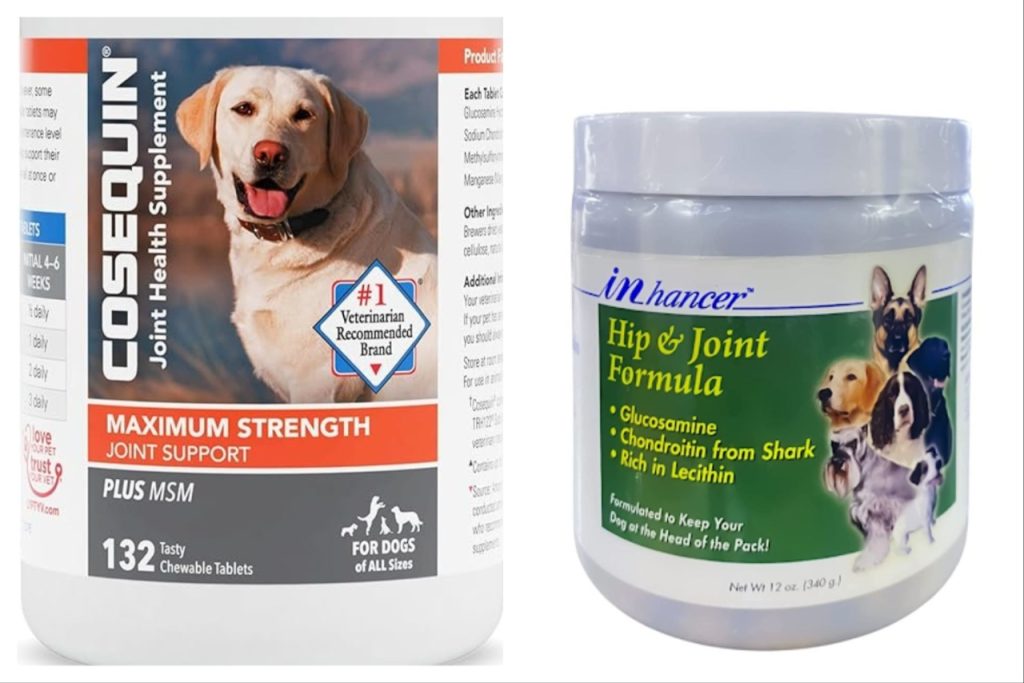The only way your dog lives long, happy, and active is if you make sure that their joint health remains intact. Over the course of time, age, genes, weight, and lifestyle can be the main contributing factors to joint degradation.
Despite this, the prevention and supporting line of treatment, along with the use of the best joint supplement for dogs, will help you to come to the conclusion of the problem, thereby even to prevent long-term joint issues. Whether they’re a lively young puppy or a senior pet, the right supplement can really bring out a huge positive impact.

Why Joint Health Shouldn’t Be Overlooked
A dog’s joints are one of the most important things for them to jump, run, and play. A lack of joint health means that mobility reduces gradually, daily activities become painful, impossible, or require surgical intervention.
Here are the leading causes of joint issues in dogs:
- Aging: The older dogs become, the more the articular cartilage is gradually reduced through melting at joint surfaces, creating a more serious situation of increased friction of joints and pain.
- Breed and Genetics: Giant breeds such as Great Danes and Mastiffs are more likely to be affected by conditions like hip dysplasia due to their genetic make-up. The smaller breeds, like Dachshunds, may develop problems of the spine.
- Obesity: Excess weight loads the joints to their breaking point, and the destruction rate will be faster.
- High Activity Levels: Although physical activity is a necessity for the proper functioning of the body, overly indulging in activities like running or jumping can result in joint injuries, particularly on surfaces that are very hard to athletes.
- Injury or Trauma: A dog that has a loosed ligament or pulled treat that hasn’t properly healed might develop arthritis or other illness.
Common Signs Your Dog Needs Joint Support
Identifying joint issues early is crucial as it allows for the therapist to apply treatment in the long term. Recognize these signs:
- Stiffness or Limping: Trouble moving, especially if he has been resting for a while or after playing.
- Reduced Activity: An unwillingness to walk, climb stairs, or jump on furniture.
- Visible Pain: Moaning, mourning, the sensitivity of the joints while they are being touched.
- Weight Shifting: Preferring one leg on the other.
- Changes in Behavior: The loss of interest in playing, decreased appetite, and obviously noticeable lethargy.
If your dog shows any of these ailments, consulting a vet could be the best decision possible. Maybe they will propose to bring a specific joint supplement that your pet needs.
Exploring Joint Problems in Dogs

As different dogs can have different joint problems, the treatment plan should be specific to the type of joint problem. Here are some common conditions:
Osteoarthritis
It is predicted that every fifth dog suffers from this degenerative disease. This is a result of the loss of cartilage and causes pain and stiffness. Senior dogs are the most affected.
Hip Dysplasia
It is important to note that one of the potential causes of the dysplastic hip, which is incorrectly positioned, is the high probability of developing arthritis and chronic pain over the long term. It is more prevalent in large dogs, but smaller breeds can also get it.
Elbow Dysplasia
The infliction is caused by deviations in the growth and development of the bones and thus results in pain and lameness. It is most common in breeds such as Golden Retrievers and Rottweilers.
Luxating Patella
It is commonly diagnosed in small breeds that the kneecap is out of place, thus causing luxating patella. If the condition is severe, the pet will be limping, and even the arthritis may progress to the stage where it is left untreated.
Also Read: 10 Best Flea Treatments for Dogs
The Role of Joint Supplements in Your Dog’s Health

Joint supplements are meant to provide the original reasons of the health of the joints. In contrast to drugs that cause the covering of the pain, supplements go through the process of mending and helping the joint construction over longer periods of time. The chief advantages include:
- Cartilage Protection: The main components are glucosamine and chondroitin, which function as cartilage barriers.
- Inflammation Reduction: MSM, omega-3 fatty acids, and other anti-inflammatory agents are used to relieve the pain from swelling and stiffness.
- Improved Mobility: Joint lubrication from hyaluronic acid or similar agents helps with smooth, pain-free movement.
- Pain Relief: They clear the inflammation and joint stress, thus the pain is naturally decreased.
Essential Ingredients in the Best Joint Supplement for Dogs
The efficiency of a joint supplement can be traced back to its ingredients. Let us closely examine the components that should be prioritized:
Glucosamine and Chondroitin
Glucosamine helps in the regeneration of cartilage, whereas chondroitin guards against its breakdown. Both of these enables nutrients to perform a whole new action as they work together for joint health.
MSM (Methylsulfonylmethane)
One of the best characteristics of MSM is its anti-inflammatory properties, it also boosts collagen protein, which is fundamental for good connective tissue.
Omega-3 Fatty Acids
They are imposed on them often as omega-3s found in fish oil, which reduce the inflammation and satisfy the weight management theory, thereby reducing the stress on the joints.
Hyaluronic Acid
Hyaluronic acid, on the other hand, functions by lubricating the joints, thereby enhancing flexibility and cushioning.
Turmeric
A very effective anti-inflammatory part of nature such as turmeric comes with curcumin, which is an active ingredient that eases discomfort and shields the tissues of the joint from injury.
Green-Lipped Mussel
Loaded with omega-3s and glycosaminoglycans, green-lipped mussel extract reduce
Selecting the Best Joint Supplement for Dogs

There are so many varieties of joint supplements out on the market, and deciding which is the best one for you seems extremely challenging.
Here are the things that should be on your mind:
1. Assess Your Dog’s Needs
Energetic dogs can use supplements that contain omega-3s in large amounts, while the older dog will need products with large doses of glucosamine and MSM.
2. Check Certifications
Look into NASC-certified products from the National Animal Supplement Council organization, whose regulation guarantees that all the products are of high quality and safe.
3. Avoid Fillers
Prefer natural compositions that don’t contain any artificial additives, dyes, or fillers.
4. Consult Your Vet
Never hesitate to call your veterinarian for professional advice when your dog takes a new supplement, especially if the animal is on medication or has a health problem.
Different Forms of Joint Supplements
All the joint supplements are offered in diverse types to the owner who wants their pet dog to love this supplement but also feel the positive effects:
- Chewable Tablets: Good for dogs that like the fruity-flavored ones.
- Powders: Powders that can be combined with food are the fastest way to give it to them without any problem.
- Liquids: Instant absorption and very appropriate for picky eaters.
- Soft Chews: Favorite treats in the form of soft chews, hence more easily consumable for them, even if they are very picky eaters.
Preventative Care: Why Start Supplements Early?
Early supplementation will deal with overexertion of joints successfully before they turn into a real problem.
Dogs belonging to certain categories that are at higher risk, such as breeds that are normally very active or dogs that have a tendency to arthritis, are highly relieved if they are supplemented from a young age. The preventive care is:
- It is the protection of the joint function through the prophylactic supplements given to a dog.
- Installs the period between the prodrome and the clinical symptoms of arthritis.
- Mitigates the accidents in dogs showing the natural tendency of being very active or in working dogs.
Also Read: Fresh Cat Food Online Delivery to Your Doorstep
What is the best oil for dogs joints?
The best fish oil for joints of dogs is the oil that contains omega-3 fatty acids (EPA and DHA) and krill oil, which are beneficial for reducing inflammation and supporting joint health. Joint care may be alternated with some coconut oil use as well, but the use of fish oil should be at the forefront of treatment for the joint.
What is the safest glucosamine for dogs?
The best glucosamine for dogs to be safe is glucosamine HCl that is from vet-approved brands like Cosequin or Dasuquin.
What is the best oil for dogs joints?
Fish oil (highly concentrated in omega-3 fatty acids, the main components EPA and DHA) is the best oil for dogs’ joints since it cuts inflammation and aids the health of the joints. In the reverse case, one can use krill oil or green-lipped mussel oil, which possess joint-relieving qualities, respectively.
Does Omega 3 help dogs joints?
Yes, Omega-3 will be good for a dog’s joints as it can decrease inflammation and support cartilage repair. This is typically the ‘joint manager’ for those diseases that are caused by arthritis and other joint problems.










